Major internet events in 2016
China's internet economy is enjoying strong momentum, highlighted by technology upgrades, business innovation and big acquisition deals in 2016. Let's take a look at the major internet events of the year.
Google's AlphaGo defeats Go grandmaster
Google's Go-playing computer program AlphaGo claimed a historic victory in the ancient Chinese boardgame over Go grandmaster Lee Sedol of South Korea in March. The computer program won four games to one in the best-of-five series.
The victory has fuelled a growing interest in artificial intelligence and boosted Chinese companies' investment in the sector.
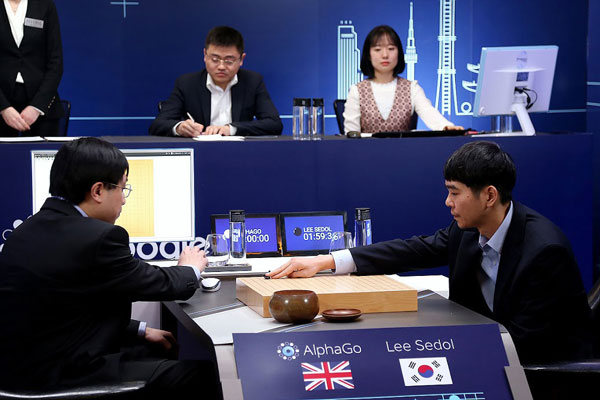
The world's top Go player Lee Sedol (right) places his first stone during the last match of the GoogleDeepMind Challenge Match against Google's artificial intelligence program AlphaGo in Seoul, SouthKorea, on March 15, 2016. [Photo/Agencies]
Baidu driverless car to operate on city roads
Baidu announces its driverless car will be set loose on city roads at the coming World Internet Conference in Wuzhen, Zhejiang province. Company senior vice-president Wang Jin, who is the general manager of the company's autonomous driving unit, announced the plans at a forum in early November.
The company hopes to realize the commercial potential of driverless cars on a small scale in three years and begin large scale production in five years.
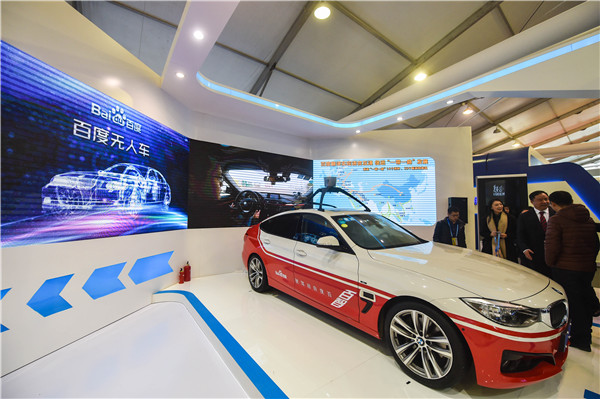
A driverless vehicle developed by the internet giant Baidu on display last December in Wuzhen, Zhejiang province.[Photo/China Daily]
Alibaba offers virtual reality shopping experience
E-commerce gaint Alibaba invested in US-based mixed reality startup Magic Leap in February. Then it announced the establishment of its own VR research lab, GnomeMagic Lab. And in July, Alibaba provided a preview of its "Buy+" virtual store at the Taobao Maker Festival in Shanghai. At the start of this month, it officially launched the virtual reality (VR) online shopping channel in the mobile app of its e-commerce site.

A journalist experiences VR shoppping at Tmall's Double 11 shopping festival in Shenzhen, Guangdong province, Nov 11, 2016. [Photo/VCG]
Ride-hailing rivals Didi and Uber join forces
Didi Chuxing, the dominant ride-hailing service provider in China, announced plans to acquire the Chinese arm of rival Uber Technologies in August.
The deal will see the competitors become small shareholders in each other's business.
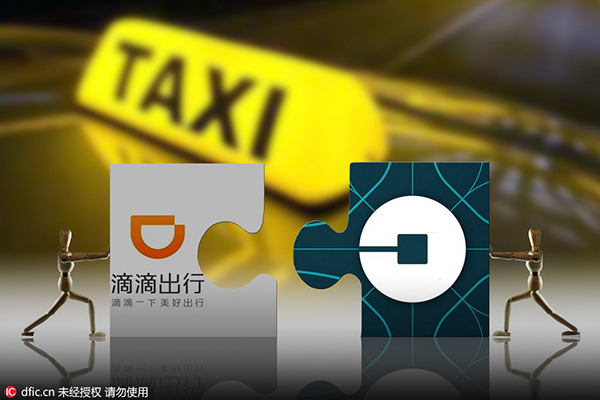
A cartoon illustrating the merger of Didi Chuxing and Uber's China operation. [Photo/IC]
China's internet celebrity economy takes off
Internet celebrities know how to attract users' attention, which can translate into cash through online advertising and e-commerce.
Papi Jiang, an internet celebrity who became famous by posting satirical videos on social media sites, received 12 million yuan ($1.8 million) in venture capital this March for a 12 percent stake in her team.

A woman and a man in a commercial live streaming event help sell essentials in Hangzhou, Zhejiang province. [Photo/China Daily]
Chinese tech companies' overseas expansion
Chinese tech companies have continued their push to expand overseas. Major deals include Tencent-led consortium’s $10.2 billion bid for Finnish game developer Supercell, Alibaba Group Holding’s purchase of a controlling stake in Southeast Asian online shopping giant Lazada Group SA for roughly $1 billion, and LeEco’s acquisition of Vizio Inc, a major TV manufacturer in the United States, for $2 billion in cash.
The list also includes Cheetah Mobile’s payment of $57 million for French news aggregator company News Republic; Baofeng Technology’s joint purchase of 65 percent stake in MP & Silva Ltd, one of world's largest sports program distributors, with Everbright Securities Co; and JD.com’s takeover of Yihaodian, an online marketplace run by Wal-Mart.
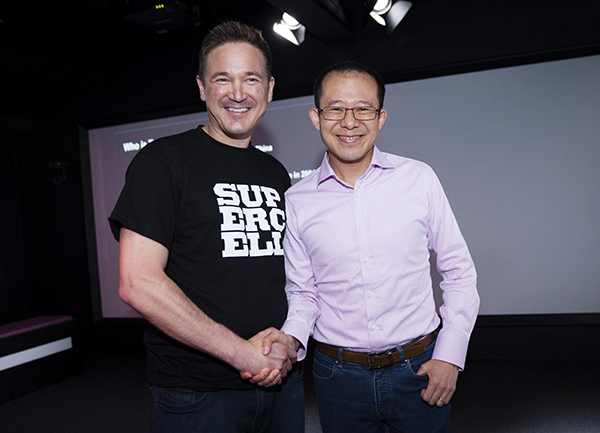
Supercell CEO Ilkka Paananen (left) and Martin Lau, president of Tencent Holdings Ltd, pose while meeting with the media in Helsinki, Finland. [Photo/Agencies]
New tax on imported e-commerce purchases
China has introduced a new tax on imported e-commerce purchases made after April.
The new policy stipulates that the cross-border retail suppliers' tax will no longer be based on the postal delivery of goods, but the customs and excise duties, import value-added tax and consumption tax.

A woman checks a can of baby formula in a pharmacy store in Hong Kong. The higher taxes on e-commerce products on the mainland may drive consumers back to Hong Kong to shop for maternity and baby products. [Photo provided to China Daily]
Mobile apps make purchases easier
More Chinese consumers preferred to make payments via smart devices as mobile apps make purchasing much easier, a PwC report found.
Nearly one-third of respondents in China opted for mobile payment when shopping last year, doubling from 16 percent in 2014, according to the accounting firm's global retail survey. The figure appeared much higher than the world's average of 12 percent.
The popularity came as a result of explosive growth of mobile payment options and an expanding mobile network.
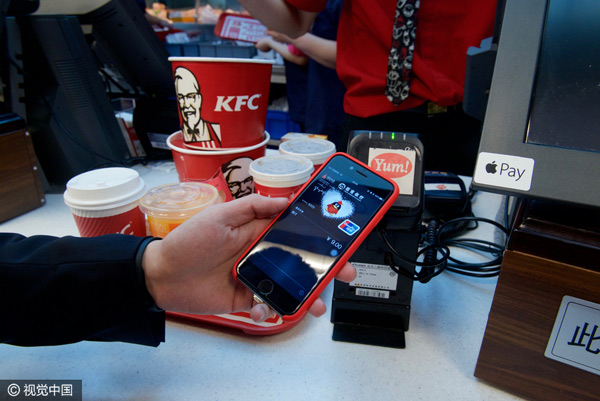
A customers pays his bill with Apple pay at a KFC store in Beijing. [Photo/VCG]
Paying-for-knowledge app a hit
An app that allows people to pay some money to get their questions answered by professionals or hear the answers, is becoming popular among Chinese internet users.
Fenda was launched in May by website, Zaihang, a platform for people who want to learn knowledge and expertise online.
There were more than one million paying customers on the app within the first three days after it launched, according to the Zaihang website.
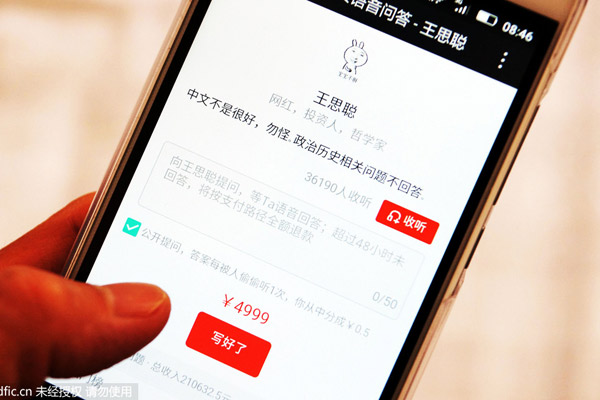
Wang Sicong, son of Chinese billionaire Wang Jianlin, Dalian Wanda Group's chairman, answers questions on the Fenda app. [Photo/IC]
Bike-sharing gets popular
Mobike and ofo, which allow people to use an app to locate and borrow available bikes nearby, get popular among young urbanites.
Since August, the Beijing-based Mobike, has landed four rounds of financing, totaling hundreds of millions of dollars. But its record is not unique, as its cross-town rival ofo has also pulled off fundraising four times. According to a report from Bloomberg, ofo is valued at $500 million, an unusually large size for a company that is just 2 years old.
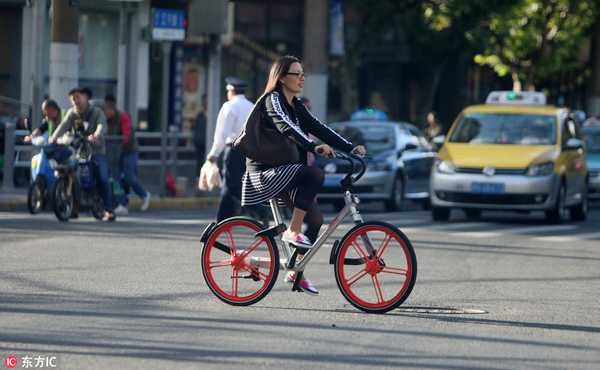
A cyclist rides one of Chinese bike-sharing service's "mobikes" in Shanghai. [Photo/IC]

 Print
Print Mail
Mail
 Zhejiang Release
Zhejiang Release Zhejiang News
Zhejiang News